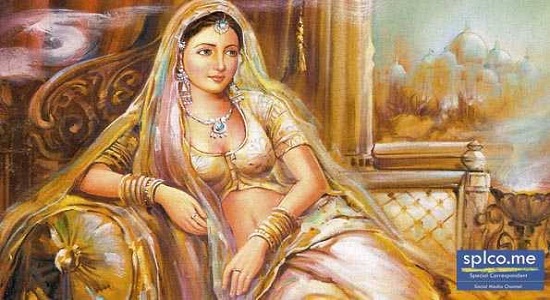Padmavati is a fictional queen in the epic poem Padmavat by 16th-Century poet Malik Muhammad Jayasi claims Padmavathi film makers.

Whereas Hindu caste fronts Last week had disrupted the shooting and slapped Bhansali on the set of the film earlier this year, vandalised cinemas, and threatened to chop off Padukone's nose, referring to a story in the epic Ramayana where a character has her nose chopped off as punishment.
The group also held protests against the film in several states, including Rajasthan, Uttar Pradesh and Haryana, which are ruled by the Hindu nationalist Bharatiya Janata Party also awards up to 10 crores been offered for beheading lead actress Deeepika and the film Director Bhansali.
Historians point out that Jayasi's epic ballad about a Muslim emperor attacking a kingdom smitten by the beauty of a Hindu queen was written in the 16th Century, more than 200 years after the historical record of the invasion.
They say the folklore around Padmavati have also been problematic as they have glorified sati. This custom was outlawed by India's British rulers in 1829 following demands by Indian reformers.
Whereas Malik Muhammad Jayasi (died 1542) was an Indian Sufi poet who wrote in Avadhi, a Hindi language. His most notable work is the epic poem Padmavat. Here goes fantasy story in the eyes of Poet Jayasai (abridged) :
Padmavati, the princess of the Singhal kingdom, is close friends with the talking parrot Hiraman. Her father disapproves of their closeness, and orders the parrot to be killed. The parrot flies away to escape the punishment, but is captured by a bird catcher, and ultimately ends up as a pet of the Chittor ruler Ratansen.
Inspired by the parrot's description of Padmavati's beauty, Ratansen decides to visit the Singhal kingdom. Joined by his 16,000 vassals and princes, and with the parrot as his guide, he reaches Singhal after crossing the seven seas. There, he tries to win Padmavati by performing austerities in a temple. Informed by the parrot, Padmavati visits the temple and returns without meeting Ratansen, although she begins to long for him.
Meanwhile, at the temple, Ratansen decides to commit suicide for having missed her. The deities Shiva and Parvati intervene, and Shiva advises him to attack the fortress of Singhal.
Disguised as ascetics, Ratansen and his followers attack the fortress, but are captured by Gandharvsen. As Ratansen is about to be executed, his bard reveals his identity.
Gandharvsen then marries Padmavati to Ratansen, and also arranges 16,000 padmini women for his companions.
As Padmavati and Ratansen consummate their marriage in Singhal, Ratansen's first wife Nagmati longs for him in Chittor. She uses a bird to send a message to Singhal, following which Ratansen decides to return to Chittor.
Ratansen has excessive pride in being married to the most beautiful woman on the earth, for which he is punished by a sea storm during the return journey.
He and Padmavati are rescued by the Ocean, but all their followers die in the storm. Lacchmi, the daughter of the Ocean, tests Ratansen's love for Padmavati by appearing before him disguised as Padmavati. Ratansen passes the test, and is rewarded with gifts by the Ocean and Lacchmi. With these gifts, he recruits a new entourage at Puri, and returns to Chittor.
In Chittor, Padmavati and Nagmati rival for Ratansen's attention. Initially, he placates them by spending nights with them alternately, but then establishes peace by reprimanding them. Meanwhile, he banishes the Brahmin courtier Raghav Chetan for fraudulently winning a contest. Padmavati gifts Raghav her bangle in order to placate him.
Raghav goes to the court of Alauddin Khalji in Delhi. When asked about the bangle, he describes the unmatched beauty of Padmavati. Alauddin then besieges Chittor, and demands Padmavati for himself. Ratansen rejects the demand, offering to pay a tribute instead. Alauddin rejects the offer, and the siege continues.
Finally, as part of fresh terms of peace, Ratansen invites Alauddin as a guest inside the fort, against the advice of his vassals Gora and Badal. Alauddin deceitfully catches a glimpse of Padmavati, captures Ratansen, and returns to Delhi.
Padmavati asks Gora and Badal to help her free Ratansen. The two men and their followers enter the fortress of Delhi, disguised as Padmavati and her companions. They free Ratansen, but Gora is killed fighting during the escape, while Badal takes Ratansen to Chittor.
During Ratansen's absence, the Kumbhalner ruler Devpal proposes marriage to Padmavati. On his return, Ratansen learns about this insult, and decides to punish Devpal. In the ensuing single combat, Ratansen and Devpal kill each other. Nagmati and Padmavati commit suicide by sati (widow's self-immolation) on Ratansen's pyre. Meanwhile, Alauddin's army reaches Chittor. Facing a certain defeat, the women of the fort commit suicide by jauhar (mass self-immolation), while the men fight to death. Alauddin captures an empty fortress, thus denied victory.
















